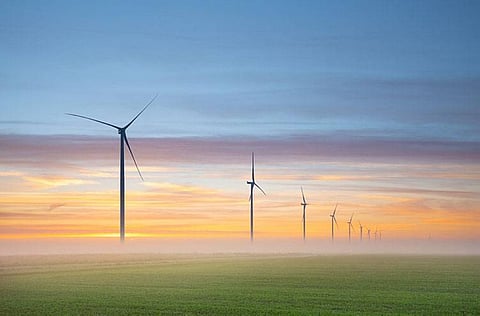

ACHIEVING national sustainable development is impossible without the right kind of energy sources to power it.
Energy policymakers, experts, and advocates in the Philippines have been engaged in heated debates over the past few years about the direction the country should take. While it is mostly recognized that the dominance of coal has to end, major differences have emerged over what should take its place.
Three suggestions -- renewable energy (RE), natural gas, and even nuclear -- are actively promoted by the current presidency as the immediate future of the country's energy sector. Yet the bottomline is that given the climate emergency, rising energy prices, and concerns about community safety and well-being, this combination simply will not allow the Philippines to achieve its goals.
The process of our economy and society moving away from coal is not just any transition that can be done with traditional attitudes and approaches to policymaking. Our current heavy dependence on coal, and to a lesser extent other fossil fuels like natural gas, would make this process difficult and delicate to execute, yet must be enacted anyway for the sake of our collective future.
It is vital for our decision-makers to implement this shift through what is called a just energy transition (JET). But what constitutes such a paradigm-shifting process?
Renewables-focused
This has to be clearly and emphatically stated: the end goal of JET is the development of indigenous RE resources into the most dominant energy source. Experts worldwide have reported that solar, wind, hydro, geothermal, and biomass should be the main fuels moving forward, especially as they remain by far the most cost-effective mitigation solution to the climate crisis and are becoming cheaper every year.
The Philippines houses tremendous untapped renewables potential, including in areas determined to have high concentrations of cost-effective RE and strong interest from prospective developers. A recent report by the Department of Energy revealed that the country hosts 152 GW of potential solar and wind energy and 650 GW of hydropower capacity.
Our country should not be distracted by promises of nuclear energy, which have clear sustainability, costs, and safety issues to which its proponents have no clear responses, or the expanded use of natural gas. The latter is another imported fossil fuel just like coal, which would only harm the attainment of our emissions reductions targets and lead to even higher electricity rates. This is not to mention that current bills in Congress promoting such an expanded use have no clear targets for their eventual phase-out, which would only hinder the inevitable and necessary RE growth.
It is unjust for our country to put another fossil fuel as a 'stopgap' towards what is needed for our long-term development as a nation. It is also unjust to favor an energy source that even a former Energy Secretary has mentioned that no community wants in their backyard.
If the Philippines, one of the most vulnerable countries to the climate crisis, wants to play a key role in addressing this issue, then a just transition to RE is the way for our development to be aligned with the goal of limiting global warming to 1.5 C.
Peoples-centric
It is not enough to simply go for the most technically-sound option to solve a problem. If this supposed solution is not carefully examined and people or the environment itself end up being harmed without mechanisms to mitigate or avoid these effects, then it becomes a false solution.
A genuine JET prioritizes responding to the needs of all Filipinos, especially the most vulnerable groups like indigenous peoples, youth, and women. It is not enough to use 'peoples-centric' as a driving force behind energy-related programs and policies; communities themselves must also be empowered to drive this process.
Policymakers have the mandate to ensure that the human rights of affected stakeholders will be respected, protected, and upheld, especially those of communities that would be directly affected by the energy programs and projects. This applies to both sides of the picture, from workers in fossil fuel industries that would be affected by the inevitable phaseout to residents nearby mining areas for energy transition minerals that are needed to build solar panels, or households threatened to be displaced by a hydropower project.
The concerns of these groups must be listened to by policymakers in all stages of the implementation of energy-related programs and projects, from planning to monitoring. They must be empowered to actively participate in decision-making processes instead of being discouraged or ignored along the way. There is no room for tokenistic approaches like having consultations without presenting the actual draft plan that would supposedly impact their energy needs and daily living.
The environment must not be forgotten through this process, either. Policymakers should be held accountable for enforcing relevant laws and policies, including those that prevent JET-related activities from taking place within areas of critical biodiversity importance and/or ancestral domain. No other price is reasonable enough to look over this important responsibility.
It is time for JET to be meaningfully integrated into climate, energy, and development laws, policies, and plans in the Philippines. As this process is launched, what should not be lost in all the discourse and actions is the goal of ensuring an energy system that provides sustainable, stable, secure, self-sufficient, accessible, and affordable energy for every Filipino.
Otherwise, if key government agencies have no intention of honoring our international commitments on energy or climate or would not implement a genuine "whole-of-society" approach that it has been mentioning so many times across administrations, then what are they doing?
***
John Leo is the Deputy Executive Director for Programs and Campaigns of Living Laudato Si' Philippines, a member of Aksyon Klima Pilipinas, and the Youth Advisory Group for Environmental and Climate Justice under the UNDP in Asia and the Pacific. He has been a climate and environment journalist since 2016.